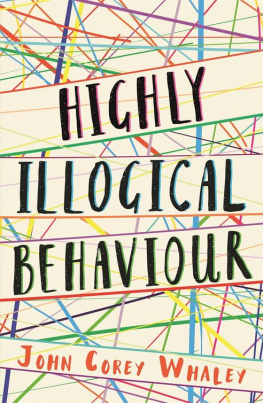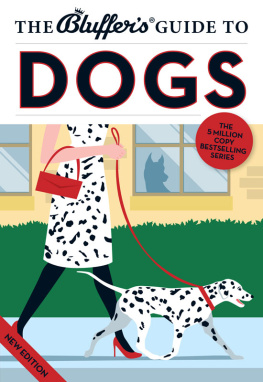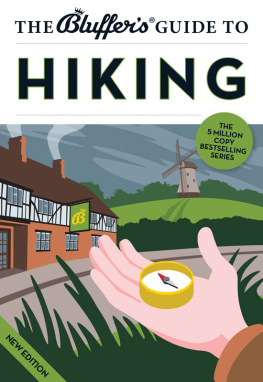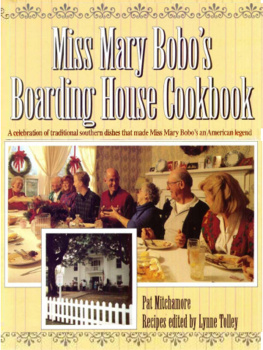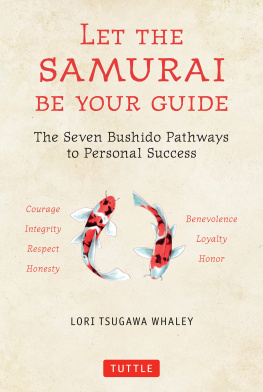Mrs. Whaley Entertains
Advice, Opinions, and 100 Recipes from a Charleston Kitchen

Emily Whaley
IN CONVERSATION WITH
WILLIAM BALDWIN
Algonquin Books of Chapel Hill
1998
I put this book together for my grandchildren and I want to dedicate it to them:
Ted
Ben
Kershaw
Douglas
Emily
Sinkler
Helen
Contents
Introduction
by William Baldwin
TO GREATLY PARAPHRASE TWAINS HUCKLEBERRY FINN, ITS POSSIBLE that you know of Emily Whaley from a previous book. In this case, Mrs. Whaley and Her Charleston Garden. I was her collaborator on that one as well. Off and on for a period of two years I visited with Emily both in Charleston and at her summer home in Flat Rock, North Carolina. We spent hundreds of hours together and I listened while this gardener in her mid-eighties spoke with a passionate joy about flowers, shrubs, and trees. Not only did we tour her Charleston garden countless times, we visited other gardens and we even shopped in nurseries. And when Mrs. Whaley and Her Charleston Garden was finally published, she said, Billy, when we started this you didnt know a violet from a pine tree, and you still dont.
Let me say in my defense that simply isnt true. But its very close to true. Still, in that two years I had managed to learn a thing or two from Emily Whaley. Not about flowers, maybe, but I learned a great deal about getting through life and enjoying the process of getting through life.
This project, Mrs. Whaley Entertains, went a bit quicker. Off and on for a year I would drive into Charleston and visit Emily. She would entertain me with stories for a couple of hours and then serve me a delicious lunch prepared either by herself or her skillful cook, Margaret. And if youre thinking nice work if you can get it, youre right. But like any other business, the business of compiling has its more difficult moments. In the middle of April (two days ago to be exact), with the entire manuscript proofed and ready to go, I went back to Charleston one final time in hopes of getting an even better concluding essay.
I found Emily in her garden with five women, total strangers from some far distant state. They were just finishing up a tour and she was posing with them for pictures. With good-byes said and us alone, she chuckled and remarked that it was really something, people wanting their pictures taken with her. I laughed and agreed. She led me to a bench in a recessed corner. The garden had never looked better, never looked more crowded with blossoms and leaves, practically none of which I could identify. (An azalea was at my elbow.) I clicked on the tape recorder.
Oh, cut that off! she said. I brought you here to relax.
And you know, I did. In that instant I forgot about publishing deadlines and all the many other discontents and demands of civilization. We sat beneath the limbs of her neighbors borrowed live oak surrounded on all sides only by the demands of April and we spoke at length about absolutely nothing that was relevant to my mission. Then, satisfied that I was in the proper state of mind, Emily took me inside and gave me the notes to a speech she had delivered the week before. Those notes and her brief explanation of them are pretty much the basis for the concluding chapter, Pilaus, which youll be coming to eventually.
As for cooking and entertaining, Im probably not much better off than I was with learning flowers. I certainly enjoy looking at flowers much more now than I once did, and I suppose I do enjoy eating food a bit more than I did a year ago. Im a bit more of a connoisseur. Ive learned that the secret to a good crab soup is cream and lots of fresh crabmeat. Ive learned that properly cooked grits have cooked for an hour. Ive gained ten pounds and Ive learned that there are joys in responsible behavior that far outweigh the burdens entailed, and Ive learned that existence is to be celebrated, not lamented.
Now, with the remainder of this space, Im going to give you a very brief biographical sketch of Emily Whaley. If youre familiar with Mrs. Whaley and Her Charleston Garden, you can skip this.
Emily was born in 1911 in the village of Pinopolis, South Carolina. Her father, Dr. FishburneDocdelivered her and at that time gave her the teasing nickname of Cheeka. Doc was a truly larger-than-life person, filled with zestful good humor and endless devotion to his family, patients, community, and bird dogs. Emilys mother, Nan, was his equal in every way. Responsible and persevering, always there for the people around her and the redbirds that waited at the steps for her each morning.
After a sheltered and happy upbringing in Pinopolis, Emily was sent off to boarding school in Charleston, where she managed to do very poorly at everything except sports, the piano, and sewing. At twenty-three she married a promising young lawyer, Ben Scott Whaley, and they lived in Washington, D.C., for several years before returning to Charleston and buying a house on historic Church Street.
Emily would have preferred to be living in the country and it was partly to placate her that her husband gave her a formal garden in their narrow backyard. In 1940, the landscape architect Loutrel Briggs laid out what would be, over the years, a very successful joint effortbetween him and Emily and, in the most recent time, between her and Junior Robinson, her gardener. The garden is visited by thousands each year.
Emily and Ben had three girls, Miss Em, Anne, and Marty, and along with their husbands and children they appear in both books. In fact, the nucleus of the book in your hands was a recipe collection that Emily originally put together for her grandchildren.
And now having said that, I present to you Mrs. Whaley Entertains. An apt enough title, for besides her many other talents, each time she opens her mouth or writes a sentence, Emily does just thatentertains.
Advice, Opinions
Lights On in the Kitchen
LIGHTS ON IN THE KITCHEN PROBABLY MEANS SOMEONE IS IN THERE BEING productivethe person who has a sixth sense about other peoples physical and psychological states of being and what to provide them with to produce energy and efficiency and comfort. She produces sugar treats and knows a lot about the word festive and how what is produced in the kitchen adds to festivities. She also knows where the peroxide is and where the scissors and screwdrivers are hiding, what someones telephone number is and also who needs a nap or a compliment.
Yes, the kitchen is the physical place most likely to produce comfort and refreshment for body and soul. A place to receive a recharge of energy and enthusiasmand a new direction if need be.
And yes, I suppose some of you younger women (especially those of you working full-time outside the home) are already gnashing your teeth and rending your veils. Well, I cant help it. This is how I truly feel about being in the kitchenmy idealized vision, at leastand it would be the same as a lie not to say so. Still, I certainly dont mean to suggest that careers are somehow bad. All three of my daughters have enjoyed careers. Nor would I bar men from the kitchen. Most of the men in my own family are excellent cooks and Im sure theyre all capable of finding scissors and offering comfort. And it should be equally obvious that marriage is not a prerequisite for good cooking or love and friendship either. In the Southern village where I grew up fourscore years ago, a virtual army of maiden cousins and widow neighbors welcomed me into kitchens that were every bit as welcoming as my own.


